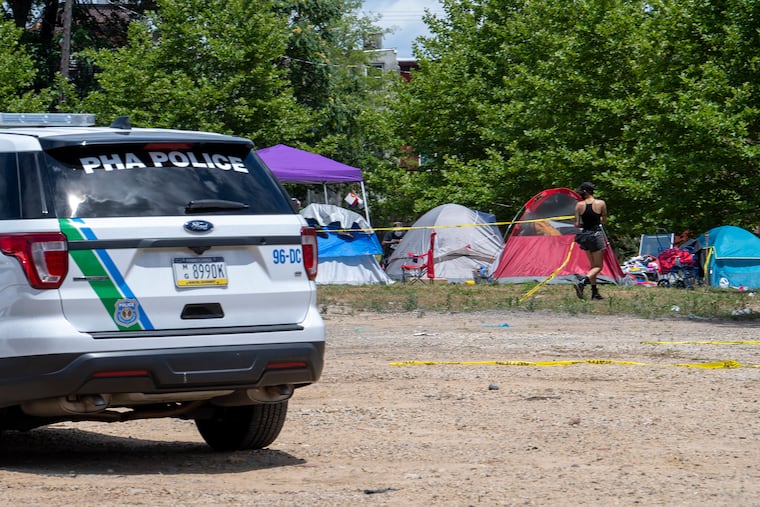Philadelphia Housing Authority tries to fence off, shut down protest encampment outside headquarters
Activists say they're fighting for the rights of poor and homeless residents. The Philadelphia Housing Authority calls the action illegal, counterproductive and dangerous.

The latest in a series of protest encampments set up in Philadelphia in recent weeks — on an unfenced vacant lot overlooking the headquarters of the Philadelphia Housing Authority — became the site of a series of skirmishes Tuesday as PHA brought in bulldozers, a cement mixer, and a work crew to fence the lot, and protesters resisted.
The dozen tents on a lot at Ridge Avenue and Jefferson Street in North Philadelphia were pitched by homeless people and volunteers, some of whom had previously been part of the camp on the Benjamin Franklin Parkway.
“They decided to come up here to live safely and peaceably, and to put pressure on the Housing Authority,” said Jennifer Bennetch, an organizer who started a group called Occupy PHA after her own run-ins with PHA police, who she said had firebombed her private home abutting PHA property. Bennetch acknowledged that the official report described the fire as being caused by her son, but said it was falsified.
Bennetch, 34, who also said she had recently helped 10 families of about 40 people move into vacant PHA-owned properties that required minimal upkeep, produced a cease-and-desist email from Larry Redican of PHA’s Office of General Counsel warning her that she could be subject to prosecution for criminal trespass. Bennetch said she believed the occupation is legal given that no notice had been posted on the property.
In an email statement provided to The Inquirer, PHA suggested that Bennetch was acting in bad faith, and said administrators are “dismayed and concerned that the Occupy PHA leader is assisting individuals and families to squat in vacant houses around the city.”
“This action is not only illegal, it is dangerous. Minor cosmetic repairs do not make vacant houses habitable. Illegal utility hookups are especially dangerous to the families and their neighbors, and can cause fires. PHA is calling on the Occupy PHA to immediately cease and desist in their actions,” PHA said in a statement.
Protesters pulled up metal posts from still-wet concrete bases and attempted to render a roll of chain-link fencing unusable by lacing it with zip ties. They stood at various points in front of bulldozers, and erected their own barriers out of pieces of wood, caution tape and traffic cones and barrels, though the heavier pieces of the barricade were quickly removed by workers. The protesters said they saw the construction of the fence as a step toward evicting the squatters.
“They’re fencing us in to arrest us, and I asked people if they wanted to move across the street, but they said they’re tired of being kicked around,” Bennetch said.
» READ MORE: Philly Police Commissioner Danielle Outlaw, Mayor Jim Kenney apologize for teargassing of protesters on 676
One of the residents, Robert Juniouz, 43, said he and his girlfriend had lived in PHA housing until October 2019, when they were evicted. He said they lost not only their home but all their possessions, because they could not pay the $1,000 owed to the storage company PHA had used.
“I was out of town. I came back and the house was boarded up,” Juniouz said. “We look at it like, if they can put this fence up, and that costs $20,000, why can’t they house us?”
Getting decent housing during the pandemic has been nearly impossible, said Juniouz, who has bounced between friends’ homes and the street for the last few months. He left the Parkway encampment in part because of his experience with PHA, and in part because he felt it had grown unsafe there, citing a recent stabbing.
The posted demands at the camp included increasing access to vacant PHA housing for low-income residents and restrictions on selling off PHA property. More broadly, they sought an end to all service days and clearing of homeless encampments, and permission to camp or set up tiny-house developments anywhere in the city.
In its response, PHA warned that the encampment currently stands in the way of imminent construction of a North Philadelphia grocery store. “The 72% African-American community requested a grocery store and PHA plans to deliver. The group leader ... is obstructing progress and does not represent the desires of the long-term residents in the community. This group is criminally trespassing, and quite frankly, are in the way of the preparation of construction of the first new shopping center in the Sharswood neighborhood in over 50 years.”
Staff writer Alfred Lubrano contributed to this article.
Correction: This story has been changed to better describe the protesters’ demand on service days.